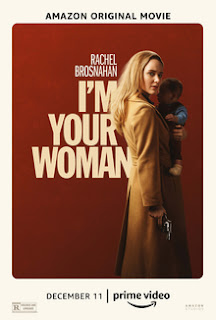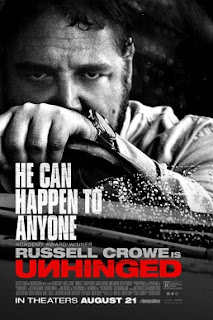Monday, December 28, 2020
Ma Rainey's Black Bottom (Netflix, 2020)
Sunday, December 27, 2020
Wonder Woman 1984 (2020)
Saturday, December 26, 2020
Wander Darkly
In my youth I loved reading books about souls trapped in some netherworld (purgatory, for example, or some respite home-base between reincarnated lives). It was intrigued that a person could live a life full of accomplishments and failures, reflect on and learn lessons from that reflection after death, then move on to another existence. And all the better for it.
I don't believe in that process, but I want to.
I sometimes think about that during times of trouble. I'll retreat and pause, and consider: "If this is part of my end-of-life review, what will I learn from it?" On occasion the answer is profound and life changing; most times, however, I give it a shoulder shrug and forget about it before my second cup of coffee.
Wander Darkly -- like the Ryan Gosling flick Stay from 2005 -- is sorta kinda about a life review. Written and directed by Tara Miele (fans of the TV Arrowverse will recognize her name) Wander Darkly is inspired by a real life event that happened to Miele. The plot is a tightly written puzzle, and the acting is superb. Although the movie is impossible to discuss without treading into spoiler territory, I was deeply affected by watching Sienna Miller work through her mounting confusion.
It forced me to think about my life decisions and actions. And I need that from time to time.
Especially with 2021 just around the corner.
Thursday, December 24, 2020
Friday, December 18, 2020
Blackbird (2019)
I'm terrified of dying.
The fear isn't about whether there is an afterlife. I don't fear pain or discomfort, or what will happen to my body after my death. (Although neither being lowered into the ground or being burned to ashes sound inviting as options, do they?) Most of those things are out of my control and fearing them serves no purpose.
I fear the space that exists between (1) when I know death is imminent, and (2) when I draw my last breath.
In that short few moments will I have regrets? Will I be frightened? If I'm surrounded by friends and family will I have the time and ability to tell them how much I love them?
You know, in a way that's more powerful than I've ever said it before.
This life-long fear is why I was eager to watch Blackbird. Watching Lily (played wonderfully by Susan Sarandon) organize and orchestrate the final weekend of her life moved me. It was painful to watch as the final reunion she had with family and friends -- a weekend she wanted to be perfect - unraveled and became something less than that. The audience feels sorry for her until it realizes that imperfection is human; it's what happens when people respond genuinely to distress, anxiety, and fear.
And that imperfection made Blackbird even more beautiful.
This Roger Michell-directed movie isn't for everyone. But if you want to reflect on your own life and mortality, Blackbird is for you.
Tuesday, December 15, 2020
I'm Your Woman
But is she? Really?
Jean's a bored gangster's wife. When we meet her she's complaining she needs more substance in her life but doing very little to make that happen. She can't fry an egg, and even sunbathing is a high maintenance activity because of those prickly bathing suit tags.
"I'm your woman?" Geez.... should I find smack-dab in the middle of a gang war- -- 'cause that happens pretty early in the movie -- Jean is not my female go-to. Jean isn't my go-to.
Gal Gadot, sure.
Give me Brie Larson's Captain Marvel any day.
Hell, in a fight I'd settle for help from Harley Quinn and her dumbass baseball bat.
But Jean? My woman? Even 90 minute into this two hour, Julia Hart-directed flick, I knew Jean wasn't. She still couldn't get the eggs fried right. She bumbled and stumbled at being a new mother, and couldn't do the most basic things necessary to keep her and her baby safe from the gangsters trying to find her.
But then she began to change. She matured; her maternal instincts kicked in. Jean stopped being a victim and took control of the situation.
She is the woman. Really.
Hart's neo-noir flick is tedious. For the first 90 minutes the pace is consistently mundane. That dull energy is a reflection of Jean's personality, though. Her perspective on life. The viewer feels frustrated by it, and we want her to step it up. When she does step it up in the final act it feels all the more enjoyable for what we had to endure.
The Jean we meet early in the film is not our woman in a crisis. The Jean we come to know, though, is.
Friday, December 04, 2020
Unhinged
If I was writing on of my trademarked "TFG One Sentence Review" about Unhinged, it would read something like:
"Unhinged is what happens when William Foster from Falling Down stops taking his medication and embraces the #MAGA "fuck you" attitude as he publicly airs his grievances."
It sorta works. Sorta.
But Unhinged is more complicated than a one-sentence review. And because of what's happening in American society these days, it deserves some attention.
Clearly, there are comparisons to be made to Falling Down, the 1993 movie starring Michael Douglas. Both Foster (played by Douglas) and Tom Hunter (the protagonist in Unhinged, played by Russell Crowe) are professional white men who find themselves overwhelmed and powerless in society. The audience watched Foster's breakdown and felt some empathy for him. We've all been there, we understand how human beings can snap.
With Falling Down we don't condone the escalating behavior we watched on screen, but we understand. [Spoken in my best Chris Rock voice.]
But the moment we meet Hunter we recognize he's unhinged. Obsessive, impulsive, and cruel. And we come to also understand that Hunter believes his actions are justified. Those who have wronged him deserve to be punished.
Perhaps most disturbing is that he believes it's acceptable for him to deliver that punishment.
That really is the scariest part of this thriller: it mirrors an emerging groupthink in American culture. How one feels about a topic or situation becomes belief. Facts are intangible and open for debate. Common disagreements become fodder for verbal and physical assault.
We now feel entitled to offer our opinions, and we feel attacked when someone disagrees with or slights us. And when someone feels attacked it's acceptable to hit back harder.
Falling Down was a warning about what could happen when people feel spread too thin, or feel out of control.
Unhinged is a reflection of what's happening today in the USA.





